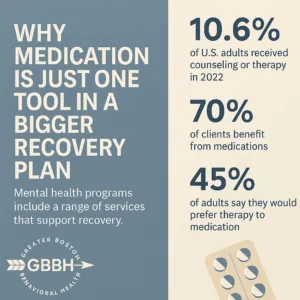Even if the diagnosis finally gave your struggle a name, something about starting medication might still feel… off. Maybe it’s the fear of feeling unlike yourself. Maybe it’s the thought of “being on something” for life. Or maybe it’s the sense that saying yes to a pill means saying goodbye to parts of who you are.
That fear is valid—and it doesn’t mean you’re not ready for help.
At Greater Boston Behavioral Health, we understand that medication is just one tool. Our mental health programs are designed to meet you where you are—gently, with options, and with your identity intact.
It’s Okay to Be Scared of Medication
If you’re afraid medication might dull your personality, take away your creativity, or flatten your emotions, you are not the only one. So many people come in with this quiet fear. They’re not anti-treatment. They just want to stay themselves.
We hear it all the time:
“What if I stop feeling like me?”
“What if it works—but only because I’m numb?”
“I want to feel better, but I don’t want to lose the parts of me I like.”
This hesitation is not resistance—it’s awareness. It means you care about how you show up in the world. And that’s something we want to protect, not override.
In our programs, no one gets medication just for showing up. You are part of the decision-making process. You get to ask questions. You get to say no. And most importantly, you get to be seen as a whole person—not just a diagnosis.
Recovery Works Best When It’s Layered
Here’s the honest truth: medication can make a real difference. For some, it’s the missing link that lets everything else finally start working. But it’s rarely enough on its own.
Mental health recovery is layered. You might think of it like rebuilding after a storm. Medication can patch the roof. But it takes therapy, skills, and support to rebuild the inside.
That’s where structured mental health programs come in. They provide the full architecture—so you’re not trying to rebuild your mental health with only a prescription bottle and a prayer.
What Else Do Mental Health Programs Offer?
At Greater Boston Behavioral Health, our programs are designed to support the whole you. Whether you’re starting with individual therapy or need more structure through IOP or PHP, each level of care wraps you in support that medication alone can’t offer.
Here’s what that can include:
- Therapy that fits you. From CBT to trauma-informed modalities, sessions are tailored to your experience.
- Psychoeducation. Learn how your diagnosis actually works—because understanding why your brain feels the way it does can bring real relief.
- Coping skills you can use today. From grounding techniques to emotion regulation, you’ll learn tools to help you in the moment.
- Community. Groups connect you with people who get it—without judgment or comparison.
- Medication support that’s paced to your comfort. If you choose to try medication, you’re never alone in the process. If you don’t, we’ll still support you fully.
One client told us:
“I thought I had to choose between being myself or getting help. This was the first place that didn’t make me pick.”
– IOP Client, 2024
Medication Can Help—but You’re Still in Control
Some clients start with medication right away. Others wait. Some never take it at all. There is no single timeline—and no judgment for where you land.
If you do choose to explore medication, it’s not a one-size-fits-all approach. You’ll work with a licensed provider who listens—to your history, your goals, your fears, and even your gut instincts.
You’re never locked into one prescription or one plan. Adjustments are part of the process. So are honest conversations about what’s working and what isn’t.
Medication can help quiet the noise so you can actually do the work of healing. But you’re the one who decides how and when to use that tool.
You Deserve a Program That Sees the Whole You
Whether you’re in Dedham, Needham, Newton, or anywhere in Greater Boston, your mental health deserves more than just medication.
Our programs meet people at all stages—from newly diagnosed to those still unsure if they even want to be here. And we honor the fact that showing up is a big deal.
Whether you’re artistic, analytical, highly sensitive, or somewhere in between, your identity matters in treatment. We’re here to help you build a plan that supports the version of you you want to keep—and gently strengthens the parts that feel tired, overwhelmed, or unsure.
Real Recovery Is Built on Choice, Not Pressure
You don’t need to be ready for everything to take one step. You don’t need to agree to meds just to get help. And you don’t have to know exactly what’s wrong before reaching out.
If all you can do today is ask a question, that’s enough.
FAQ: Medication & Mental Health Programs
Do I have to take medication to join a mental health program?
No. At Greater Boston Behavioral Health, we never require medication to begin treatment. You can start with therapy, group work, or other services without any pressure to begin meds.
What if I start medication and don’t like how it makes me feel?
That’s a valid concern. If a medication isn’t helping—or is making things worse—you can talk to your provider about adjusting the dose, switching medications, or stopping. You are not stuck.
Is therapy still helpful if I’m already taking medication?
Absolutely. Medication can stabilize symptoms, but therapy helps you understand patterns, develop skills, and create lasting change. Most effective recovery plans use both.
I’m scared medication will change my personality. Is that true?
This fear is common and understandable. The goal of psychiatric medication is to reduce suffering, not erase identity. Many people report feeling more like themselves after finding the right support—not less.
How do I know if a mental health program is right for me?
If you’re feeling stuck, overwhelmed, or unsure how to manage your mental health, a structured program can help. Even if you’re not in crisis, programs like outpatient therapy or IOP can offer grounding, insight, and support.
Ready to explore your options—at your pace?
Call (888) 450-3097 or visit to learn more about our mental health programs services in Boston, Massachusetts.


